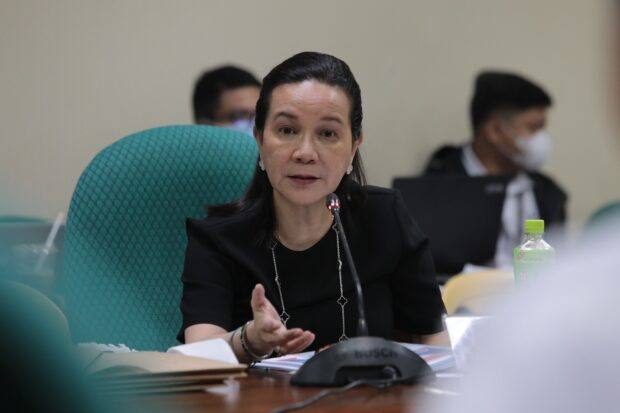
Sen. Grace Poe (File photo from the Senate Public Relations and Information Bureau)
MANILA, Philippines — A review of the K-12 program, the implementation of educational reforms and the creation of more jobs by government agencies were among the recommendations made by lawmakers on Wednesday after a Commission on Human Rights (CHR) study showed that new graduates were having a hard time finding work because of their lack of “soft skills” — a consequence of the COVID-19 pandemic.
“Ten years after it was implemented, we believe the K-12 curriculum needs an honest-to-goodness review to determine the enhancements needed to make it more responsive and relevant to the needs of our students,” Sen. Grace Poe told the Inquirer.
“We hope concerned government agencies in charge of the review will make this a priority, which can also be useful to the joint congressional oversight committee on the K-12 program in its own assessment,” she said.
Along with Senators Jinggoy Estrada, Juan Edgardo Angara and Risa Hontiveros, Poe pointed out that problems besetting the country’s education sector had existed for decades even before the pandemic happened.
“The government, together with the private sector, must [make a] serious effort to address the seeming lack of job readiness of graduates, which could impede their employment,” she said.
Senate Minority Leader Aquilino Pimentel III agreed with Poe, saying there should be an assessment of the current curriculum for basic and tertiary education.
“In the meantime, since there are curricula to follow, educators and teachers should look at the substance, the rationale behind the subject matter and make sure the students/learners get the benefit intended,” Pimentel said.
“Let us not just ‘go through the motions.’ But we need to start immediately the review of the curriculum at all levels,” he added.
Apprenticeship
For Senate Majority Leader Joel Villanueva, a longtime advocate of technical and vocational education, government agencies should work together to create additional jobs in various sectors.
“We have to assist agri-fishing, manufacturing and other sectors to create new and sustainable jobs, address issues on school-to-work transition and ensure industry-relevant skills and core skills,” he said.
Estrada, chair of the Senate labor, employment and human resources development committee, pointed out that he had been proposing since 2014 the institutionalization of an apprenticeship program to equip the youth with the skills needed to get jobs. “Apprenticeship programs have the unique capability of immersing our younger workers in real-life employment atmospheres, enabling them to learn technical skills, practical knowledge and experience to make them employable and competitive,” he said.
DTI, Tesda roles
Estrada also urged the Department of Trade and Industry (DTI) and the Technical Education and Skills Development Authority (Tesda) to offer more programs to “upskill” Filipino workers.
“We need to institute reforms not only in the educational system…, but also in human resource development strategy,” he said.
Angara, on the other hand, said that appropriate state agencies should craft better programs not just in teaching students with soft skills, but also in addressing other concerns, such as poor reading comprehension.
“The lack of soft skills was already a problem of graduates before the pandemic,” he noted.
For Edcom 2 discussion
Angara expressed confidence that issues raised by the CHR would be discussed in the ongoing Second Congressional Commission on Education (Edcom 2), a national commission tasked to conduct a comprehensive assessment and evaluation of the country’s education sector.
For Hontiveros, Edcom 2 must be able to come up with a “game-changing strategy” in solving the education sector’s “wicked problem.”
“Time is of the essence in implementing education reforms,” she said. “The last thing we need is an employment crisis on top of an education crisis.”
Based on the findings of the CHR report, new graduates were having a harder time getting hired as many of them lacked soft skills related to empathy, creativity, resilience and communication, as well as practical job skills best honed through face-to-face classes.
Sen. Francis Tolentino, however, doubted the accuracy of the CHR findings, which were based on the results of focus group discussions with the youth, teachers, government officials and school administrators. “While there are some perceived deficiencies relative to the online delivery of instruction, some soft skills, such as time management, perceptiveness, listening and self-discipline, among others, were developed during that pandemic online experience,” he said.
For Rep. Joey Salceda, the CHR report was consistent with the findings of other global studies showing that learning suffered as students were forced to study in isolation.
But he said he would not “immediately jump into the conclusion that the lack of soft skills is primarily the source of youth unemployment.”
“What we should instead do is to figure out what kind of skills, in general, … our economy needs to thrive and be resilient,” Salceda said as he pointed out that some were obviously more relevant like language proficiency, particularly in English, engineering, the computer sciences, and medical sciences, “especially in an aging world.”

